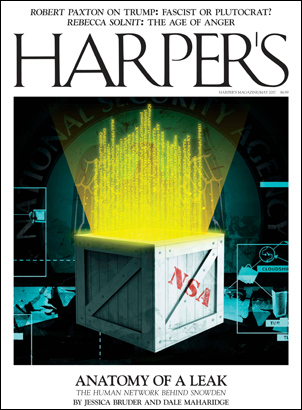Inside the May Issue
The human network behind Snowden's leak, the scandal of mental health in West Africa, Islam's forgotten reformation, and more...
 When Dale Maharidge’s new flame asked him to put his cell phone in the refrigerator during his first visit to her Tribeca loft in 2012, he was puzzled. But as he soon learned, Laura Poitras had reason to be wary of electronic eavesdropping—she was in the midst of shooting a documentary about the NSA’s new data center under construction in the Utah desert. And within weeks, she would be contacted by a mysterious whistleblower, who asked her for a snail-mail address in New York. Since Maharidge’s association with Poitras would already be clear to any interested parties, he suggested a friend and fellow journalist, Jessica Bruder. What showed up on Bruder’s doorstep shortly thereafter was a drive containing an enormous trove of encrypted NSA documents, sent by the whistleblower himself, who would soon reveal his identity: Edward Snowden. By default, Maharidge and Bruder were now part of his data-smuggling network. Their role in the subsequent Mother of All Leaks was small but crucial, and the two authors tell all in “Snowden’s Box.” Their tale is a caper, a nail-biting exercise in paranoia, and an object lesson to whistleblowers. It also reveals the analog underbelly of contemporary spy craft—sometimes the best way to beat the surveillance state is the old-fashioned postal system.
When Dale Maharidge’s new flame asked him to put his cell phone in the refrigerator during his first visit to her Tribeca loft in 2012, he was puzzled. But as he soon learned, Laura Poitras had reason to be wary of electronic eavesdropping—she was in the midst of shooting a documentary about the NSA’s new data center under construction in the Utah desert. And within weeks, she would be contacted by a mysterious whistleblower, who asked her for a snail-mail address in New York. Since Maharidge’s association with Poitras would already be clear to any interested parties, he suggested a friend and fellow journalist, Jessica Bruder. What showed up on Bruder’s doorstep shortly thereafter was a drive containing an enormous trove of encrypted NSA documents, sent by the whistleblower himself, who would soon reveal his identity: Edward Snowden. By default, Maharidge and Bruder were now part of his data-smuggling network. Their role in the subsequent Mother of All Leaks was small but crucial, and the two authors tell all in “Snowden’s Box.” Their tale is a caper, a nail-biting exercise in paranoia, and an object lesson to whistleblowers. It also reveals the analog underbelly of contemporary spy craft—sometimes the best way to beat the surveillance state is the old-fashioned postal system.
In “A Prayer’s Chance,” Brian Goldstone looks at the perilous state of mental health care in Ghana—a nation often touted as the great success story of western Africa. The problem goes far beyond the predictable shortage of doctors and hospitals. As it happens, most of the mentally ill in Ghana have little choice for treatment but Pentecostal prayer camps: entire communities of mud-and-thatch dwellings where faith healing stands in for medication and therapy, and where the sickest patients are chained to trees out in the open. Yet what are the afflicted to do when there is nothing better? And how are the pastors in charge, many of them well-intentioned, supposed to help the afflicted, especially when traditional NGOs and funders regard them as evangelical charlatans? As in many other societies, and not excluding our own, it is the patients who suffer in the end.
Robert O. Paxton asks the $64,000 question in “American Duce”: is our current president a fascist or a plutocrat? And in “Bee-Brained,” Vauhini Vara poses a more lighthearted query: how do you win a spelling bee? Young Indian-Americans have for the past decade dominated such contests in this country. These prodigies think nothing of reeling off the correct spelling of chremslach or tathagata or hypophyge—words that seem to have been poured at random from the Scrabble pouch. How do they do it? And why should one ethnic group have a virtual headlock on the coveted Scripps National Spelling Bee? The author, herself a recovering spelling ace, has some decidedly non-essentialist answers.
In Readings, Bruno Latour looks at the dreary calculus of political populism and climate-change denial. Donald Trump’s original contribution to this mess, he writes, lies in his ability to “bring together, in a single movement, a mad dash for maximum profit (the new members of his team are billionaires), a whole nation’s mad dash backward to ethnic divisions, and finally, an explicit denial of the geologic and climactic situation.” There is also a CIA mini-manual on determining whether a colleague is gay (“Very few employees come to work wearing eye makeup or My Sin”), a snippet from Anaïs Nin’s unexpurgated diaries (“All I ask is passion with Rupert”), and Henry David Thoreau’s favorite poetic phrases for trees, which include a “vast Corinthian column” and the more Nin-like “athlete that shows its well-developed muscles.” Elsewhere in the magazine, we have “My First Car,” a perceptive and pixilated story by the extraordinary Joy Williams. There is also Christine Smallwood on Maurice Sendak, Yasmine Seale on our narrow, cliché-clogged grasp of Islamic history, and Christopher Beha on the riddle of consciousness, especially as it bedevils the American philosopher and cognitive wonk Daniel Dennett.



